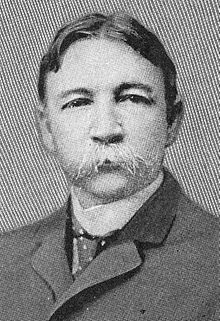William D. Jelks
| William D. Jelks | |
|---|---|
 |
|
| 32nd Governor of Alabama | |
|
In office June 11, 1901 – January 14, 1907 |
|
| Lieutenant |
Vacant Russell M. Cunningham |
| Preceded by | William J. Samford |
| Succeeded by | B. B. Comer |
| Personal details | |
| Born |
November 7, 1855 Warriorstand, Macon County, Alabama |
| Died | December 13, 1931 (aged 76) Eufaula, Alabama |
| Political party | Democratic |
William Dorsey Jelks (November 7, 1855 – December 13, 1931) was an American Democratic politician who was the 32nd Governor of Alabama from 1901 to 1907; he had been a newspaper publisher and editor. He also served as acting governor between December 1 and December 26, 1900 when governor William J. Samford was out-of-state seeking medical treatment (Alabama law at the time required the governor to relinquish authority of the office if he left the state for any reason for more than 20 days). When Samford died on June 11, 1901, Jelks became governor. In 1904, Jelks fell ill and left the state for treatment; Russell Cunningham acted as governor in Jelk's absence from April 25, 1904 to March 5, 1905.
Jelks, an Alabama native, graduated in 1876 from Mercer University in Macon, Georgia, where he was a member of the Chi Phi Fraternity. In 1879, Jelks acquired a substantial interest in the Union Springs Herald; later that year he bought and became the editor of the Eufaula Times. During his residence in Eufaula, Alabama, Jelks served on the board and as superintendent of education for the city schools.
Elected to the Alabama Senate from Barbour County, Alabama in 1898, Jelks served as chairman of the Committee on Constitution, Constitutional Revision and Amendment. In 1900, he was elected President of the Senate. Alabama did not have an office of lieutenant governor under the State Constitution of 1875, thus, Jelks, by virtue of his position as President of the Senate, served as acting-governor during the temporary incapacitation of Governor William J. Samford from December 1–26, 1900, and succeeded to the office on June 11, 1901, after Samford died.
As governor, Jelks played an active role in securing the ratification of the State Constitution of 1901. The new constitution reinstated the office of lieutenant governor and established the term of office of governor as four years. Developed according to the Mississippi model, it established requirements for voter registration that effectively disfranchised most blacks and tens of thousands of poor whites. Blacks were disfranchised for more than 60 years, until after passage in the mid-1960s of federal civil rights legislation. Elected to his first full term in 1902, Jelks was the first Alabama governor elected to serve a four-year term.
...
Wikipedia
